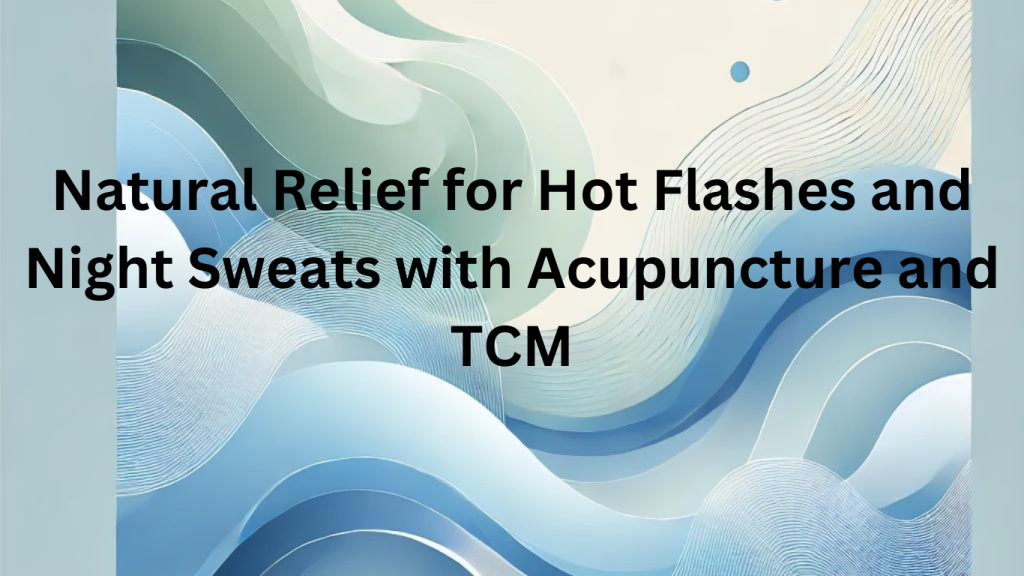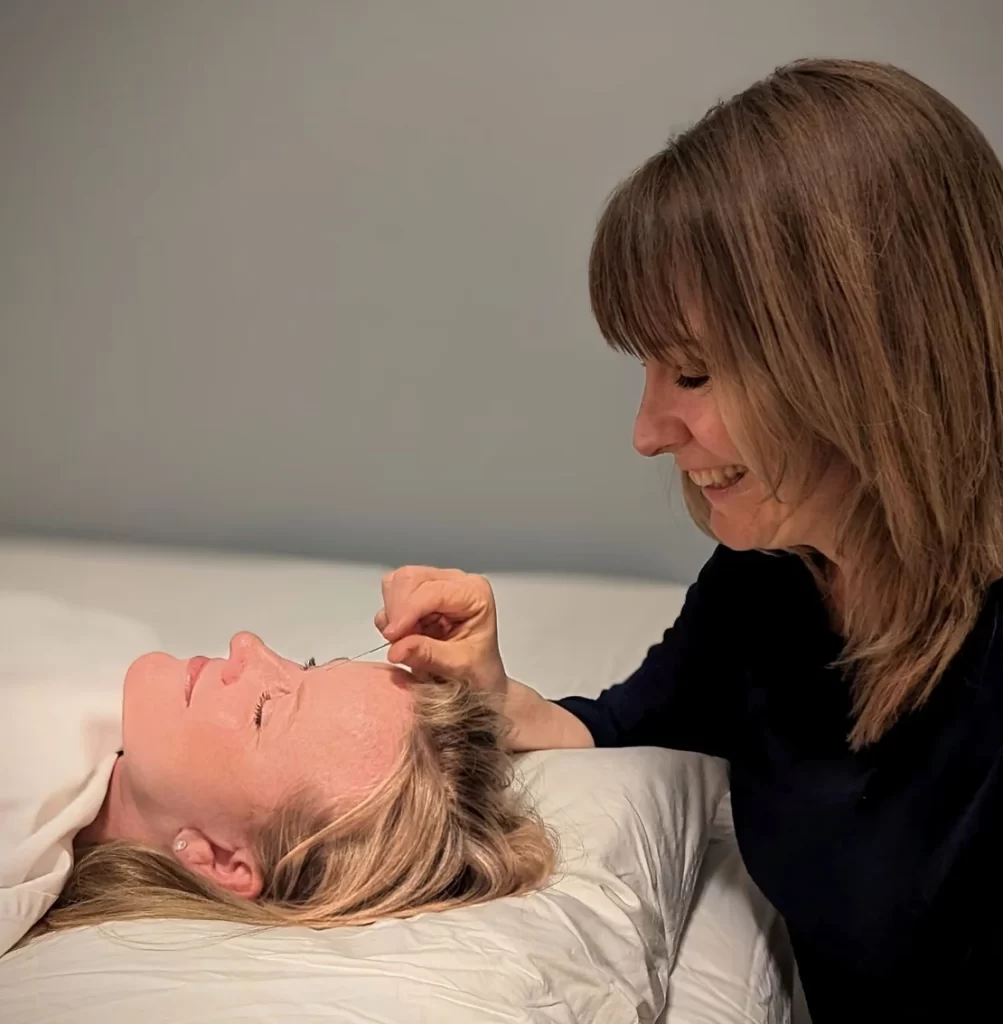
Menopause and perimenopause bring a host of symptoms that can disrupt daily life, including hot flashes, night sweats, mood swings, and more. Traditional Chinese Medicine (TCM) and acupuncture offer natural, effective ways to manage these symptoms and restore balance to the body.
Understanding Menopausal Symptoms
Hot flashes are sudden feelings of intense heat, often accompanied by sweating and a flushed face. Night sweats are similar but occur during sleep, causing you to wake up drenched and uncomfortable. These symptoms are among the most common and distressing aspects of menopause and perimenopause.
Perimenopausal Symptoms
Perimenopause is the transitional period before menopause, characterized by hormonal fluctuations that can lead to irregular periods, mood swings, sleep disturbances, and more. Managing these symptoms early can improve quality of life and ease the transition into menopause.
Traditional Chinese Medicine Perspective :Balance of Yin and Yang
In TCM, health is viewed as a balance between the opposing forces of Yin and Yang. Menopause is often seen as a decline in Yin, which can lead to an excess of Yang, causing symptoms like hot flashes and night sweats. Restoring the balance between Yin and Yang is essential for alleviating these symptoms.
Organ Systems Involved
TCM identifies several organ systems that play a role in menopausal symptoms:
Kidneys: Considered the source of reproductive energy and hormones. A decline in Kidney Yin can lead to hot flashes and night sweats.
Liver: Responsible for the smooth flow of Qi and blood. Liver Qi stagnation can cause irritability, mood swings, and menstrual irregularities.
Heart: Controls the mind and emotions. Heart Yin deficiency can lead to insomnia and anxiety.
More Than Just Organs
When we talk about Organs in TCM, we don’t just think about their structure and function as discovered by Western medicine (so don’t be concerned about your physical organ, that is not what I am referring to here). We consider each Organ to create specific symptoms when they are out of balance. This information is extremely helpful for an Acupuncturist and Traditional Chinese Medicine Practitioner to diagnose what is happening with each patient.
For example, when we discuss perimenopause, there is more than one type of perimenopausal person because each person’s body is balanced in a specific way, which leads to specific symptoms. These specific symptoms help us diagnose what is going on for you, allowing us to provide more accurate and individualized care.
Common TCM Diagnoses for Menopausal Symptoms
Kidney Yin Deficiency: Symptoms include hot flashes, night sweats, dizziness, and dry skin. Treatment focuses on nourishing Kidney Yin with herbs like Rehmannia (Shu Di Huang) and Anemarrhena (Zhi Mu).
Kidney Yang Deficiency: Symptoms include fatigue, cold hands and feet, and frequent urination. Treatment involves warming the Kidneys with herbs like Cinnamomum (Rou Gui) and Aconite (Fu Zi).
Liver Qi Stagnation: Symptoms include irritability, depression, and breast tenderness. Treatment aims to move Liver Qi with herbs like Bupleurum (Chai Hu) and White Peony (Bai Shao).
Heart Yin Deficiency: Symptoms include palpitations, anxiety, and insomnia. Treatment involves calming the mind and nourishing Heart Yin with herbs like Suan Zao Ren (Ziziphus) and Bai Zi Ren (Biota).
How Acupuncture Can Help: Balancing the Body’s Energy (Qi)
Acupuncture works by stimulating specific points on the body to balance Qi, improve circulation, and restore harmony. For menopausal symptoms, common points include:
Kidney 3 (Taixi): Strengthens Kidney Yin and Yang.
Liver 3 (Taichong): Moves Liver Qi.
Heart 7 (Shenmen): Calms the mind and nourishes Heart Yin.
Regulating Body Temperature
Acupuncture can help regulate the body’s thermostat, reducing the frequency and intensity of hot flashes and night sweats. By balancing Yin and Yang energies, acupuncture helps maintain an even body temperature.
Promoting Better Sleep
Acupuncture and herbal medicine can calm the mind and nervous system, promoting better sleep and reducing night sweats. Improved sleep quality can significantly enhance overall well-being.
TCM Herbal Remedies
Herbal medicine is a cornerstone of TCM. Each different perimenopause type requires their own specific herbal formula. A TCM practitioner can tailor herbal formulas to address individual needs.
Benefits of Acupuncture and TCM
Natural and Holistic: TCM offers a natural approach without the side effects often associated with conventional treatments.
Personalized Treatment: TCM treatments are tailored to the individual, addressing specific symptoms and overall health.
Improved Quality of Life: Regular treatments can alleviate symptoms, improve mood, and enhance overall health and well-being.
Practical Tips for Managing Symptoms
Hydration and Diet
Hydrate: Drink plenty of water and cooling herbal teas like peppermint and chrysanthemum.
Diet: Incorporate cooling foods such as cucumbers, watermelon, and leafy greens. Avoid spicy foods and alcohol, which can trigger hot flashes.
Lifestyle Adjustments
Stay Cool: Use fans, wear light clothing, and stay indoors during peak heat.
Regular Exercise: Engage in moderate exercise like walking, yoga, or tai chi to maintain health and reduce stress.
Patient Success Stories
Many patients have found significant relief through acupuncture and TCM. Here’s a testimonial from one of our satisfied patients:
I spent years trying different medications for relief of extreme hot flashes with no success. Then I was referred to Dr. Kelloway and she changed my life. After hearing my story she nailed down an effective treatment plan which is a combination of acupuncture and diet. This plan has dramatically minimized and controls my symptoms. Thanks to Dr. Kelloway I got my life back.
-Michelle
Conclusion
Acupuncture and Traditional Chinese Medicine offer effective, natural solutions for managing menopausal and perimenopausal symptoms. By balancing the body’s energy, regulating temperature, and promoting overall well-being, TCM can help you navigate this transition with greater ease and comfort.
Don’t let hot flashes, night sweats, and perimenopausal symptoms control your life. Book your acupuncture session today and experience the benefits of TCM.
References
-
National Center for Complementary and Integrative Health:Acupuncture
-
Mayo Clinic:Menopause
-
Journal of Traditional Chinese Medicine:Herbal Medicine for Menopausal Symptoms

